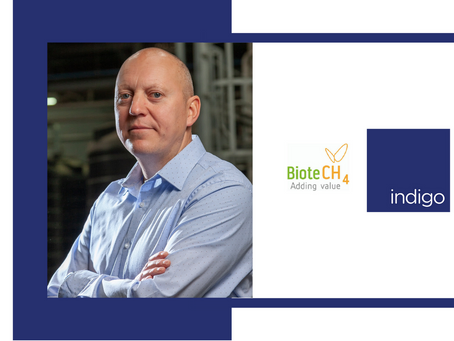
- Indigo Environmental Ltd

-
Indigo chats to… BioteCH4

Here at Indigo Environmental, we’re passionate about sustainable and localised plastic recycling. That’s why we work closely with our clients to understand their individual requirements.
But don’t just take our word for it, here Lee Sanderson, plant manager at BioteCH4, explains more about the company and what it’s really like working with us…
1. Tell us a bit about your company
BioteCH4 is one of the UK’s leading anaerobic digestion (AD) operators – with five plants and one waste transfer station located across the breadth of the country. We have around 140 employees across the whole group and an overall processing capacity of 0.5 million tonnes – roughly 200MW per each of the five AD sites. 2. Describe what your company does in one sentence:
In a nutshell, we look after the collection and transportation of food waste, oils, and fats for recycling – an environmental cause we’re extremely passionate about. 3. When did you first start working with Indigo?
We’ve been working with Indigo since the summer of 2020. 4. And in what capacity?
Indigo’s plastic recycling plant processes plastics from the food waste industry – such as buckets containing plate scrapings, oils, and sauces. The resulting washings from the production line’s cleaning and granulating stages are a valuable feedstock for our AD plants and are used to generate a biomethane gas, which can either be cleaned up and fed back into the national grid – to power people’s houses – or we can put it through a CHP system to generate electricity.
5. Why did you decide to partner with Indigo?
We’d worked with the Indigo team before and knew their values and ethos aligned with our own. 6. Explain in three words what it’s like working with the team:
A natural fit. The Indigo team is so easy to work with, and we have common ground in that we want to help to create a more sustainable, less wasteful plant, through recycling. 7. What is one of the biggest waste management challenges facing the food packaging recycling sector? There are a multitude of challenges that will affect the food packaging sector over the coming years, and the Plastic Packaging Tax that comes into force in 2022 is one of them. Organisations – across a range of industries – will be taking steps to ‘do the right thing’ to help contribute to a more circular economy. However, as part of this, many will be turning towards compostable or paper-based packaging.
But what many companies don’t realise is that the UK’s infrastructure isn’t geared up to be able to deal with vast volumes of compostables, and that cardboard packaging alternatives aren’t necessarily ‘easier’ to recycle compared to plastic – this was apparent with the ban on plastic straws in October last year. Taking butter and spread cartons as an example, plastic materials are simple to de-package and wash, however if this is paper based, it’s tricker to clean and as a result, more difficult to recycle. In some instances, it makes more sense to stick with plastic and ensure that it’s reprocessed and reused effectively. 8. In your opinion, what role does (or should) plastic recycling play in a circular economy?
It plays an important part for sure. It’s not merely about what material is used but its overall sustainability – as this determines whether it can be recycled or not. We know, for example, that paper can be recycled, but it can’t if it’s covered in food waste. Therefore it’s more of an education piece, not only for consumers, but going back a stage to manufacturers and their marketing teams as well. Plastic shouldn’t be demonised, as long as it’s properly managed, it’s a sustainable packaging option for the long term. 9. And what are your hopes for the future of the plastic recycling industry?
That better advice is given out about the recycling and reuse of this valuable material, and that the overall management of this commodity is vastly improved. The plastic recycling industry is one which has progressed really well over the last four to five years, and other industries are way behind what this sector is doing, so I also hope that other areas follow suit and develop, to help us reach a truly circular economy across the board. 10. What advice would you give to other businesses looking for a sustainable plastic recycler?
Do the due diligence test. There are too many plastic recycling companies that secure your business and then disappear – be sure to look at the history, longevity, and reliability of the company before any partnerships are established.
If you’d like to take part in our client Q&A series, please contact our PR representative, Amy Lloyd via amy@scribapr.com.
